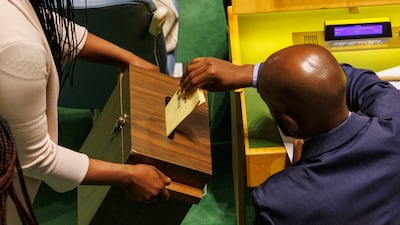The UN General Assembly on Thursday elected Denmark, Greece, Pakistan, Panama and Somalia to join the Security Council for two-year terms starting on January 1, 2025.
All five countries ran unopposed for a seat on the 15-member council, which was established after the Second World War to try to maintain international peace and security. Seats are distributed among regional groups to ensure geographical representation.
Denmark received 184 votes, Panama 183, Greece 182, Pakistan 182 and Somalia 179.
The five elected nations have served on the council previously: Pakistan seven times, Panama five times, Denmark four times, Greece twice and Somalia once.
They will succeed Mozambique, Japan, Ecuador, Malta and Switzerland.
These elections are pivotal for the UN, shaping the make-up of its most crucial body. The Security Council holds the exclusive authority to authorise military intervention, impose international sanctions and approve peacekeeping missions, among other critical responsibilities.
Political polarisation in the Security Council is expected to persist, significantly influencing its dynamics in 2025.
The Israel-Gaza war and its spillover effects in the Middle East have deeply divided the Council and are likely to remain on its agenda in 2025, depending on developments in Gaza.
Among the member nations that have been elected, Denmark, Greece and Panama maintain strong ties with Israel and abstained from the October 2023 General Assembly resolution calling for a humanitarian truce in Gaza.
However, Denmark and Greece voted in favour of the December 2023 General Assembly resolution demanding an immediate humanitarian ceasefire, while Panama abstained, reflecting changing stances as the humanitarian situation in Gaza worsened.
Pakistan and Somalia, both members of the Organisation of Islamic Co-operation (OIC), supported both resolutions and have condemned Israel’s actions in the Gaza war.
Recently, all five candidate countries voted in favour of the May 10 General Assembly resolution granting new “rights and privileges” to the State of Palestine and urged the Security Council to reconsider Palestine’s request for UN membership.
Greece's Foreign Minister Giorgos Gerapetritis, speaking to reporters in New York after the vote, declined to address whether Israel is committing war crimes in Gaza, calling instead for “an overall holistic assessment of the situation”.
“What I can say at this very moment is that this humanitarian nightmare needs to stop. There's no justifiable grounds to actually legitimise any source of disproportionate aggression.”
Richard Gowan, UN director for the International Crisis Group, said Pakistan will be a very prominent member of the Council especially over the Middle East, just as it has been very strong in the General Assembly over Gaza.
“The Pakistanis maintain a close relationship with the Chinese and are expected to co-ordinate their UN positions with Beijing,” he told The National.
He further noted that Somalia will likely prioritise the UN presence within its borders, leaving less room for other issues.
“Many UN members hope Denmark will emulate Norway's recent example by playing a co-ordinating role among the elected 10, while also engaging in back-channel diplomacy with the divided P5,” he added.
To ensure geographical representation, seats are allocated to regional groups. But even if candidates are running unopposed in their group, they still need to win the support of more than two thirds of the General Assembly.
Louis Charbonneau, UN director at Human Rights Watch, criticised the uncontested elections for Security Council seats, stating they make a “mockery of the word 'election'“.
“Member countries should give themselves a choice so governments responsible for serious human rights abuses can be rejected. That’s what happened last year, when Belarus was defeated in a competitive election for the Eastern European group’s council seat.”


